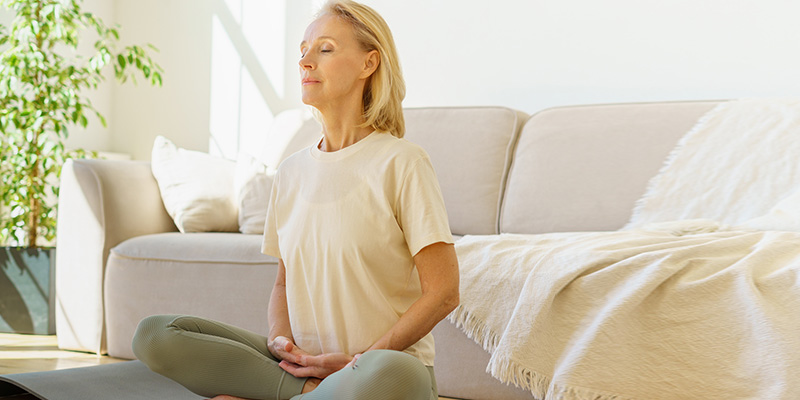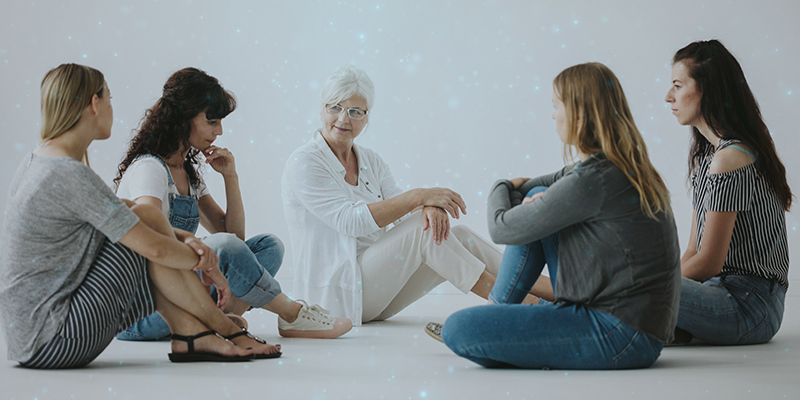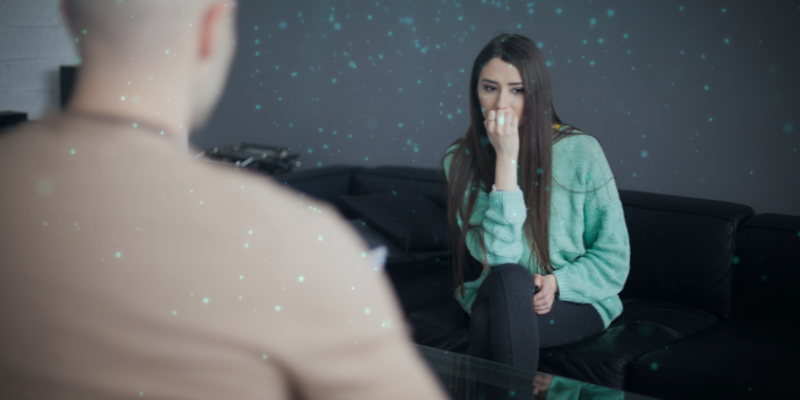
A large 2021 study in The Lancet found that 34% of people who tested positive for COVID-19 experienced psychiatric or neurologic issues within the first 6 months of being diagnosed. Anxiety disorders ranked highest among the mental health conditions, affecting 17% of those infected. Another study published in 2021 in the Journal of Neurology, Neurosurgery & Psychiatry confirms that people who have tested positive for COVID are at a slightly higher risk for anxiety and depression compared with people who have never had the infection.
The emerging research shows that you don’t have to be hospitalized or have a severe case to feel the mental health effects. Even people with mild cases of COVID-19 may develop anxiousness or panic attacks or may experience a worsening of anxiety symptoms. Experts point to several potential causes for the symptoms of long COVID, including inflammation and vagus nerve dysfunction.
Experts point to several potential causes for the symptoms of long COVID, including inflammation and vagus nerve dysfunction. Click To TweetTHE VAGUS NERVE, LONG COVID, AND ANXIETY
What is the vagus nerve? The body’s lengthiest cranial nerve, the vagus nerve stretches all the way from the brain to the large intestine. The word “vagus” means “to wander” in Latin, and this nerve essentially wanders throughout the body, connecting the brain, heart, lungs, gut, and intestines. It plays a role in a variety of involuntary bodily functions, including heart rate, perspiration, and getting food from the mouth into the stomach.
The vagus nerve is involved in both the sympathetic (fight or flight) nervous system and the parasympathetic (rest and digest) nervous system. It activates the sympathetic nervous system when you’re in a dangerous or stressful situation and then switches back to the parasympathetic nervous system when the threat is gone. When vagal tone—how well your vagus nerve communicates with all these various organs—is healthy, your body is able to downshift back into relaxation mode more quickly. In some people, this important nerve can get stuck in fight-or-flight mode, ramping up feelings of nervousness and anxiousness
Emerging research points to a link between long COVID symptoms—such as tachycardia (fast heart rate), dysphonia (difficulty speaking), and dysphagia (difficulty swallowing)—and vagus nerve dysfunction. One study used ultrasound to examine the vagus nerve in patients with long COVID and found changes, such as nerve thickening as well as signs associated with inflammation. Additional research suggests vagus nerve stimulation may have therapeutic benefits for those suffering from long COVID.
NATURAL WAYS TO STIMULATE THE VAGUS NERVE AND CALM ANXIETY
Here are 12 natural ways to stimulate the vagus nerve and elicit a relaxation response.
1. Get vocal.
The vocal cords located at the back of the throat are connected to the vagus nerve. Gargling, singing loudly, humming, or chanting activates the nerve and improves vagal tone. A 2019 study in BMJ Open found that singing significantly reduced anxiety over a 6-month period.
2. Go for a foot massage.
Reflexology is a method of massage that when used on the feet activates the vagus nerve, decreases sympathetic response, and lowers blood pressure, according to findings in a study in Alternative Therapies in Health and Medicine.
3. Try cold exposure.
Research shows that cold water immersion triggers vagus nerve activity that is associated with a decrease in heart rate. Take a cold shower, go outdoors on a frosty day, or simply immerse the top half of your face—down to your cheeks—in cold water to elicit the response. As an added bonus, research shows that cold water also reduces inflammation.
4. Use your mind to warm your hands.
Using metal imagery to warm your hands counteracts the stress response and increases parasympathetic tone and relaxation. A number of studies report lowered blood pressure with hand-warming, including one study from Korea, in which a significant decline in the systolic and diastolic blood pressure was observed in the treatment group.
5. Watch what you eat.
High-fat and high-carbohydrate diets have been found to impair vagus nerve signaling, according to a 2021 study in Scientific Reports. Conversely, consuming fiber-rich foods—such as oatmeal, broccoli, or chia seeds—improves vagal tone for better signaling.
6. Enjoy a belly laugh.
Letting out a good chuckle can stimulate the vagus nerve and promote relaxation in response to stress. One 2018 study in BioPsychoSocial Medicine suggests that simply hearing laughter can increase a parasympathetic response.
7. Meditate.
Decades of research show that this ancient practice stimulates the vagus nerve, decreases the sympathetic fight-or-flight response, promotes relaxation, and calms anxiety.
8. Get active.
Physical exercise promotes vagus nerve stimulation while lowering the stress responses associated with the sympathetic nervous system.
9. Blow on your thumb.
This may sound weird, but it works. Put your thumb in your mouth and blow on it, but don’t let the air escape. This odd trick activates the vagus nerve.
10. Breathe deeply.
Scientific findings indicate that slow diaphragmatic breathing activates the vagus nerve and reduces the stress response. It can also help break a panic attack quickly. To do it, lie on your back and place a small book on your belly. When you breathe in, make the book go up, and when you breathe out, make the book go down. Shifting the center of breathing lower in your body will help you feel more relaxed and in better control of yourself.
11. Listen to calming music.
Music creates vibrations that can impact the vagus nerve, according to scientific studies. Listening to relaxing music can trigger a parasympathetic response that reduces anxiousness.
12. Smell the lavender.
Aromatherapy activates the parasympathetic nervous system, according to research. Specifically, the scent of lavender was found to soothe anxiety in a 2017 study.
OTHER NATURAL WAYS TO SOOTHE COVID-RELATED ANXIETY
Natural supplements that can help promote relaxation and calm an anxious mind include:
- GABA: Low levels of GABA (gamma-aminobutyric acid) have been found in many psychiatric disorders, including anxiety. GABA is an amino acid that has a calming effect for people who struggle with anxiety or stressful thoughts. It promotes relaxation.
- Magnesium: In the brain, magnesium helps activate GABA receptors, which can help calm the brain and reduce anxious thoughts.
- Probiotics: A healthy gut is critical for a healthy and calm mind.
- Omega-3 fatty acids: Research shows that omega-3s may help reduce anxiety.
- L-theanine: Found in green tea, l-theanine inhibits the excessive firing of neurons, which results in a feeling of calmness and more self-control.
Anxiety, long COVID, and other mental health issues can’t wait. At Amen Clinics, we’re here for you. We offer in-clinic brain scanning and appointments, as well as mental telehealth, clinical evaluations, and therapy for adults, teens, children, and couples. Find out more by speaking to a specialist today at 888-288-9834 or visit our contact page here.





I have recently been through two rounds of antibiotics and now my gut seems to be messed up. I have severe
Lower
Tummy pain and went to check for cdif
– no guy infections and suggestions
Comment by Mary Hennessy — June 27, 2022 @ 3:21 AM
Perhaps try kefir drink or yoghurt, and plain ‘live’ yoghurt to soothe your gut
Comment by Alice Mander — June 27, 2022 @ 9:16 AM
I have been battling the worst panic attacks since I had Covid!This is great information!
Comment by Lynn Mormello — June 27, 2022 @ 11:38 AM
I’m a multiple mini stroke survivor and epileptic because of that And suffering from anxiety and depression for a long time. I am on medication for them ( effexor)contracted covid about a month ago. Anxiety seems higher. Paranoid alot.
Comment by David Anthony Emilo — June 27, 2022 @ 5:43 PM
I had COVID in 12-21. In Feb of 22, anxiety and depression worsend significant. IO went to hosdpital and they would not accept me due to still testing positive for Covid. Meds increased and anxiety and depression became significantly worse. Was in haspital in June 22 for 6 days . Had to change meds. Significtanly better but still strugling. I really belive that worseing of symptoms was a result of Covid.
Comment by Jacquie Morrey — June 28, 2022 @ 12:59 PM